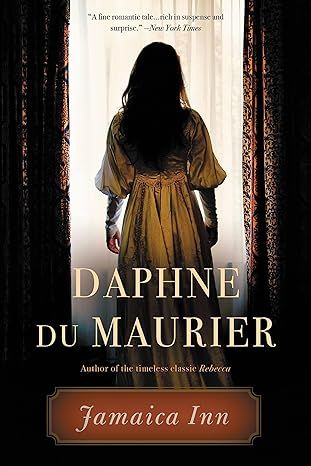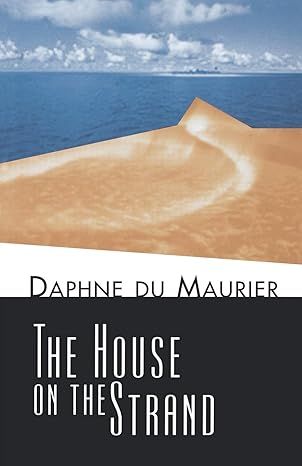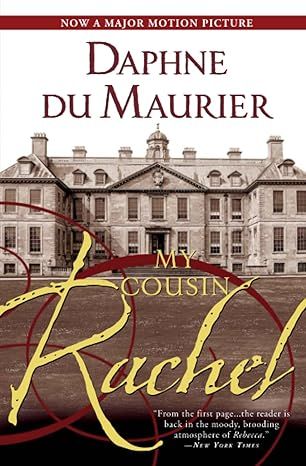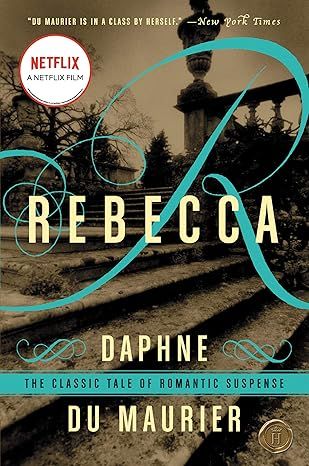Jamaica Inn
4.2
-
7,797 ratings
From the author of Rebecca and The Birds: a classic thriller of shipwreck and murder, "rich in suspense and surprise" (New York Times Book Review).
On a bitter November evening, young Mary Yellan journeys across the rainswept moors to Jamaica Inn in honor of her mother's dying request. When she arrives, the warning of the coachman begins to echo in her memory, for her aunt Patience cowers before hulking Uncle Joss Merlyn. Terrified of the inn's brooding power, Mary gradually finds herself ensnared in the dark schemes being enacted behind its crumbling walls -- and tempted to love a man she dares not trust.
The inspiration for the 1939 Alfred Hitchcock film.
Kindle
$9.99
Available instantly
Audiobook
$0.00
with membership trial
Hardcover
$24.22
Paperback
$17.49
Ships from
Amazon.com
Payment
Secure transaction
ISBN-10
0316575224
ISBN-13
978-0316575225
Print length
320 pages
Language
English
Publisher
Back Bay Books
Publication date
September 04, 2023
Dimensions
5.5 x 1 x 8.5 inches
Item weight
10.4 ounces
Product details
ASIN :
B00GR5MZIC
File size :
1238 KB
Text-to-speech :
Enabled
Screen reader :
Supported
Enhanced typesetting :
Enabled
X-Ray :
Enabled
Word wise :
Enabled
Editorial Reviews
Amazon.com Review
Jamaica Inn is a true classic. After the death of her mother, Mary Yellan travels to Jamaica Inn on the wild British moors to live with her Aunt Patience. The coachman warns her of the strange happenings there, but Mary is committed to remain at Jamaica Inn. Suddenly, her life is in the hands of strangers: her uncle, Joss Merlyn, whose crude ways repel her; Aunt Patience, who seems mentally unstable and perpetually frightened; and the enigmatic Francis Davey. But most importantly, Mary meets Jem Merlyn, Joss's younger brother, whose kisses make her heart race. Caught up in the danger at this inn of evil repute, Mary must survive murder, mystery, storms, and smugglers before she can build a life with Jem.
About the Author
Daphne du Maurier (1907–1989) has been called one of the great shapers of popular culture and the modern imagination. Among her more famous works are The Scapegoat, Jamaica Inn, Rebecca, and the short story "The Birds," all of which were subsequently made into films—the latter three directed by Alfred Hitchcock.
Sample
Foreword
Jamaica Inn opens with echoes of Dracula: a carriage rattling through a desolate landscape and wild weather to a place where even the locals won’t go, so ferocious is its reputation. Inside rides Mary Yellan, newly orphaned and en route from the tame farmland of the Helford area to the rainswept moors of nineteenth-century Cornwall and the married home of her aunt, a woman once known for her rich curls and girlish laughter. We are in the territory of the gothic novel, but one with an undercurrent of modern sensibility.
Mary’s destination, Jamaica Inn, stands dark and forbidding at the top of the moor. It is the house from hell. At night the sign outside twists in the wind like a human body on a gibbet. Inside, the place reeks of neglect, drink and male violence. The lovely giggling Aunt Patience is now a gaunt, shaky wreck, her spirit destroyed by abuse, and her husband, Joss Merlyn, is a monster: physically overwhelming, lumbering, violent and drunk. By the end of the first day, as the light bleeds away and Mary barricades herself in her miserable little room, a pact has been made with the reader. This is going to be a journey into darkness, and it’s going to deliver both violence and sensation.
It doesn’t take long to find out why the inn and its landlord are so feared. Early on, most readers will have guessed the reason. Cornwall, with its bleak, treacherous coastline and wild weather, was for much of its history a law unto itself. Jamaica Inn may now be a tourist trap reduced to kitsch by the publicity of minor literary fame, but when du Maurier would have first seen it, in the 1920s, it would no doubt have been a more desolate place which, with the right imagination, could easily be transformed into Robert Louis Stevenson territory and the heart of a smuggling ring that not only hides the booty but runs a gang of wreckers who lure the ships onto the rocks to drown their crew and steal their cargo.
There’s no doubt that many of the ingredients of Jamaica Inn—wild men, wild land, dark secrets and violent ends—are close to gothic cliché and would have been even in 1936 when Daphne du Maurier wrote the book. But what makes the novel still vibrant is to see how in the hands of a master storyteller—because that is exactly what du Maurier is—the form can be revitalized and even to some measure reinvented.
The way she does it is twofold: first by sheer force of plotting. Mary, alarmed and demoralized, may have found herself in hell, but she has no option but to stay, held by her loyalty to her aunt and the need to protect her. In the eyes of the community that makes her virtually an outlaw herself. All good thrillers have to isolate their hero if the threat is really going to bite, and even when Mary manages to get herself out of the house, the desolation of the moors only mocks her helplessness, the landscape and the weather as much a force in this book as any of the characters. The only other people she meets are in their own way as bizarre as the inn’s inhabitants. There is her uncle’s younger brother Jem, a horse thief and an adventurer whose attraction keeps her on the wrong side of the law, and the strangely tender mercies of one Francis Davey, the Vicar of Altarnun, a fabulously unnerving character whose soft speech clashes with his bleached albino looks and his heavy whip on the horse’s back.
But for most of the book it is Mary’s battle with Joss Merlyn that keeps you turning the page. As a character he isn’t to everybody’s taste. Du Maurier’s own biographer, Margaret Forster, finds him near to caricature, and it’s true that he is larger than life. But there is also a terrible fascination to him. His brooding figure, craggy looks and wild temper are in their own way all attributes of the romantic hero inverted into violence and self-loathing—a Mr. Rochester without a Jane to redeem him. Before guilt and drink disabled Joss he would have been a charismatic figure. (Du Maurier had lived too long with a glamorous, powerful father—the actor Gerald du Maurier—not to have understood that there is a price to be paid for charisma.) There is something in Joss Merlyn’s torment that smells of damage done as well as inflicted. And it’s here that Jamaica Inn pushes at the boundaries of the romantic genre to suggest how passion between men and women can lead to abuse. Joss’s wife may now be a quivering victim, but at one point she was madly in love with this powerful man, believing she could somehow save him from himself. There is a hint of collusion here, and despite her fear Patience still makes excuses for Joss, trying to deflect his anger in a way that only provokes it further. Du Maurier herself doesn’t excuse him. Admittedly, she gives him a childhood with its own history of violence, and an abused, helpless mother, but she never lets him off the hook. For all his physical strength he is a weak character, and though Mary may be morally and physically repelled by him she is also up for the battle. And a battle it is, from the moment he latches onto her both as his prey, the next woman after his wife that he must break and destroy—and also in some desperate hope that Mary will match him and somehow bring him to redemption.
There is an extraordinary scene halfway through the book—in its way much more frightening than the real thing, which comes later—when Joss emerges from a drinking bout to accost Mary in the kitchen. Crazed by waking nightmares, he offers up a lacerating confession about the ships he has lured onto the rocks and the survivors he has bludgeoned to death in the roaring surf, their faces coming back to haunt him. His terror at that moment is much greater than Mary’s, but it is her sentence to be the helpless listener. It is worth knowing as you read this scene that du Maurier’s own husband, the affable, charming, good-looking Frederick Browning, had been a war hero; one of the things that marked the early years of their marriage was the way he would wake at night screaming, and she would have to try and comfort him. Some of du Maurier’s own helpless horror is in Mary as she watches, repelled and overwhelmed by her uncle’s raving confessions.
This painful realism of the relationship between men and women also underpins Mary’s growing attraction to her uncle’s brother, Jem. There is a quiet cynicism to du Maurier’s description of their courtship. Mary knows that Jem will probably bring her as much pain as happiness, but she accepts it as part of how the world works. She has watched it unfold too many times around her to be fooled: seen how a teasing courtship down sun-drenched lanes will be replaced by the mundanity and exhaustion of married life, the man “calling sharply that his supper was burned, not fit for a dog, while the girl snapped back at him from the bedroom overhead, her figure sagging and her curls gone, pacing backward and forward with a bundle in her arms that mewed like a cat and would not sleep.” Du Maurier had had her first child just a few years before she wrote this novel and while the nanny had done more caring than she ever did (the one time she was left with the baby it screamed its head off), there is a taste of experience to the vision. For a book which at one level is a romantic adventure story, Jamaica Inn is full of decidedly unromantic thoughts.
The novel doesn’t dwell on them though. It’s too busy winching the story ever tighter. Once you get past the second chapter it’s almost impossible to read Jamaica Inn slowly. It is the burden of thriller writers to have the reader tell them admiringly how fast they read your books. “I couldn’t put it down” is both the greatest compliment and the cruelest cut of all, since it almost certainly means that a reader’s greed to get to the end of the book will have made them careless with some of the best writing on the way. It’s a trade-off thriller writers have to accept. But du Maurier never set out to write literary fiction. Her style is intelligent and fluid, sufficient unto the cause of telling the story. But then it wasn’t her style that made her famous. That’s not why she is still being reprinted when a hundred other writers of her age are footnotes in fiction. And while she has dated in certain respects—her dialogue can sometimes feel a little stilted and there are perhaps one too many dark nights and haunted moors for modern taste—almost seventy years have in no way dimmed her capacity to hook the reader like a fish and angle them in through the rising waters of the plot. There is virtually no spare action here. It would be invidious to give away the last twist, and while there will be those who see it coming, foresight doesn’t rob it of its elegant baroque menace, with more than a touch of the Hannibal Lecter/Clarice Starling relationship thrown into the dark mix. Mary Yellan sups with many devils in this book and by the end there is not even a long spoon between them.
In the end—well, in the end the book resolves itself as any good gothic adventure should, by bringing the reader out of darkness into at least a semblance of light. Mary Yellan survives. But even though the writer doesn’t say it directly, you can be sure Mary will not sleep well at night. That is the price you pay for winning such battles. The good triumph but, like du Maurier’s husband, they remain damaged by the fight. For all of her privileged middle-class upbringing, by the time Daphne du Maurier wrote Jamaica Inn at the comparatively young age of 29, she too, already had something of darkness about her. She was, in fact, well on her way to Rebecca.
Sarah Dunant
2003
Read more
About the authors
Daphne Du Maurier
Daphne du Maurier was born in 1906 and educated at home and in Paris. She began writing in 1928, and many of her bestselling novels were set in Cornwall, where she lived for most of her life. She was made a DBE in 1969 and died in 1989.
Reviews
Customer reviews
4.2 out of 5
7,797 global ratings
ellen
5
NOVELS THRU AMAZON
Reviewed in the United States on August 14, 2024
Verified Purchase
I ORDERED JAMAICA INN BY DAPHNE DUMAURIER. I ORDERED JUST 'GOOD' QUALITY, BUT THE BOOK I RECEIVED LOOKED BRAND NEW - MAYBE HAS BEEN READ ONCE PREVIOUSLY. ALSO, SINCE THE BOOK WAS SHIPPED IN SUCH A TIMELY MANNER, I RECEIVED IT A NUMBER OF DAYS EARLY. I DONATE THE BOOKS I'VE READ TO NURSING HOMES, HOSPITALS, ETC. SO WAS QUITE PLEASED WITH THE QUALITY. WILLL DEFINITELY ORDER FROM THIS COMPANY AGAIN.
Read more
Suzee2
5
A wonderfully dark and suspenseful gothic tale
Reviewed in the United States on February 25, 2017
Verified Purchase
Before I start my review, a word of warning if you buy Kindle versions of Daphne Du Maurier's books:
Some unscrupulous entity has been selling shortened and reworded Kindle versions of Du Maurier's books. There is nothing in the product description that states that it's not the authentic version of the book. These versions are meant to deceive the buyer. Amazon posts the same reviews to both the real versions of the books and the fake versions, even though they are not at all the same product. To be sure you are buying the legitimate Kindle edition, check the product details to make sure you are buying the version published by Little, Brown, and Company and sold by Hachette Book Group.
My review of Jamaica Inn: Jamaica Inn was first published 80 years ago, but it has held up well. Du Maurier does a great job of making the English moor into a dark and forbidding place. The days are short. The rain is constant. The rocks are large and sharp. One false step and hidden bogs will suck you down to your death. The Inn itself is cold and damp, rundown and isolated. Life is difficult. Du Maurier populates her story with complex and fascinating characters - a young and innocent leading lady, her violent and alcoholic uncle, her meek and abused aunt, a charming and dangerous horse thief, a violent gang of criminals that lures ships to their doom on the rocky shore, and an albino (!) vicar. There's plenty of violence, but it's not as explicit as it would be in a book written today. It was fascinating to see how her situation affected our young heroine. The ending left me with a lot to think about. I heartily recommend Jamaica Inn if you are a fan of gothic suspense. The writing may seem a little bit dated by today's standards, but it's a quick read and Du Maurier is terrific author.
Read more
130 people found this helpful
KB
5
As entertaining as it is gothic. 4.5 stars
Reviewed in the United States on April 15, 2020
Verified Purchase
Oh, how utterly Gothic is Daphne's tale of Mary Yellan. It is a treat to me, having not read much since beginning an overnight grocery job, and having not read much Gothic fiction in general, to dig into a historical novel filled with suspense and richly detailed. I actually began reading this a while ago, took a break from it, then last week, steamed through the last 100 pages in 3 days. It was a good decision, as the final third of the book begs to be read in nearly one sitting. Characters were good. Mary isn't the most relatable main character for a man in his 30's, but she was still a fairly well-developed protagonist. Of course the most memorable character, Joss Merly, was quite the antagonist, but I liked that Du Maurier showed him having humane moments and thoughts. Jem is another interesting character. I couldn't give this a full five stars only because it's a tad bit predictable near the end, and I guessed an outcome slightly before the reveal. Overall, Jamaica Inn is a tightly written and plotted thriller, a blast to read, and an admirable work by Daphne Du Maurier, who proves she has a bit of a dark imagination at times, and, twisted reader like myself, that's absolutely a positive. Definitely looking forward to watching the two adaptations (I already own the Hitchcock film), and more of Miss Du Maurier's work in general
Read more
21 people found this helpful
Joy Archer Yeager
5
all the hallmarks of a great Gothic tale
Reviewed in the United States on July 2, 2015
Verified Purchase
"Turn back around!" you want to shout to Mary Yellan in the first pages of "Jamaica Inn." Why would she abandon the green and hospitable village she'd always called home for this tomb of a place in the rugged moors? Why doesn't she listen to the coachman as he implores her not to go in? There's evil in this place. It's clear. As you can guess, she stays, and from there on you are in for a journey of mystery, horror, and romance, all the hallmarks of a great Gothic tale.
It will also have you thinking. While savoring the story, and wondering what is really going on, you get much to reflect upon, including the role of women in this society, the pull of physical attraction against common sense, the spectrum of evil, and questions about whom you can trust. Daphne DuMaurier does all of this with a superb use of language that takes you right there into the strange journey that Mary takes from the moment she exits the coach: all the mysterious and dark things going on around her, and the innermost workings of her mind.
Daphne DuMaurier is a master storyteller. Before I picked up this one, I'd only read "Rebecca," and that was a long time ago. Now I can't wait to read more.
Read more
Magmurph
4
Sad, a good read
Reviewed in the United States on May 14, 2024
Verified Purchase
Kept me reading for a whole rainy day. Du Maurier is one of the classics! I read Rebecca a very long time ago so I did not remember how the writing would be so vivid.
Best Sellers

The Tuscan Child
4.2
-
100,022
$8.39

The Thursday Murder Club: A Novel (A Thursday Murder Club Mystery)
4.3
-
155,575
$6.33

Sapiens: A Brief History of Humankind
4.6
-
140,302
$13.49

The Butterfly Garden (The Collector, 1)
4.3
-
88,556
$9.59

Things We Hide from the Light (Knockemout Series, 2)
4.4
-
94,890
$11.66

The Last Thing He Told Me: A Novel
4.3
-
154,085
$2.99

The Perfect Marriage: A Completely Gripping Psychological Suspense
4.3
-
143,196
$9.47

The Coworker
4.1
-
80,003
$13.48

First Lie Wins: A Novel (Random House Large Print)
4.3
-
54,062
$14.99

Mile High (Windy City Series Book 1)
4.4
-
59,745
$16.19

Layla
4.2
-
107,613
$8.99

The Locked Door
4.4
-
94,673
$8.53




